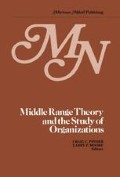Abstract
For the most part, I think Professor Benson has captured the spirit of the four articles that he has reviewed. In particular, I believe he responsibly articulates my multilectic approach to social scientific knowing. However, I would like to indicate a few subtle misinterpretations-due, I believe, to Benson’s unwillingness to accept the Zen paradigm in toto. Secondly, I would like to expand on the possibility of an integration/coupling of our organizational research endeavors. Finally, I reiterate my conclusions and heartily support Benson’s conclusions regarding the epistemological nature of social science.
Access this chapter
Tax calculation will be finalised at checkout
Purchases are for personal use only
Preview
Unable to display preview. Download preview PDF.
References
Benson, J.K. Organizations: A dialectical view. American Science Quarterly, 1977, 22, 1–21. On the potentialities of middle range theory: Commentary on Bobko, Pinder and Moore, Sekaran et al., and Schuler. In C. Pinder and L. Moore (Eds.), Middle Range Theory and the Study of Organizations. Martinus Nijhoff, 1979.
Bernstein, R.J. The Restructuring of Social and Political Thought. New York: Harcourt, Brace & Jovanovich, 1977.
Darlington, R.B. Multiple regression in psychological research and practice. Psychological Bulletin, 1968, 69, 161–182.
Pinder, C., and Moore, L. The inevitability of multiple paradigms and the resultant need for middle range analysis in organization theory. In C. Pinder and L. Moore (Eds.), Middle Range Theory and the Study of Organizations. Martinus Nijhoff, 1979.
Sekaran, U.; Martin, T.; Trafton; R., and Osborn, R. Nomothetical nets and higher order factor analysis in middle range theory development. In C. Pinder and L. Moore (Eds.), Middle Range Theory and the Study of Organizations. Martinus Nijhoff, 1979.
Author information
Authors and Affiliations
Editor information
Editors and Affiliations
Rights and permissions
Copyright information
© 1980 Martinus Nijhoff Publishing
About this chapter
Cite this chapter
Bobko, P. (1980). Zen and Science. In: Pinder, C.C., Moore, L.F. (eds) Middle Range Theory and the Study of Organizations. Springer, Dordrecht. https://doi.org/10.1007/978-94-009-8733-3_13
Download citation
DOI: https://doi.org/10.1007/978-94-009-8733-3_13
Publisher Name: Springer, Dordrecht
Print ISBN: 978-94-009-8735-7
Online ISBN: 978-94-009-8733-3
eBook Packages: Springer Book Archive

